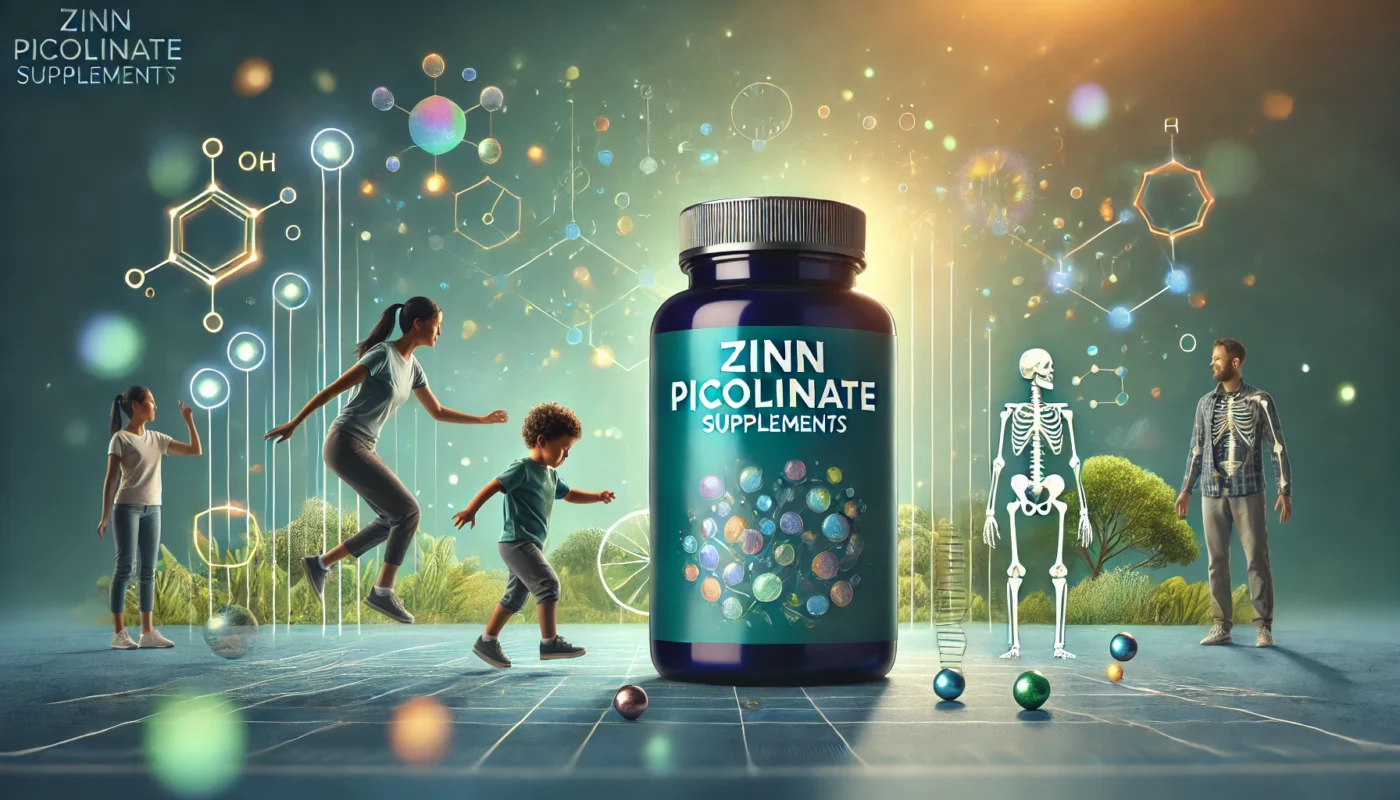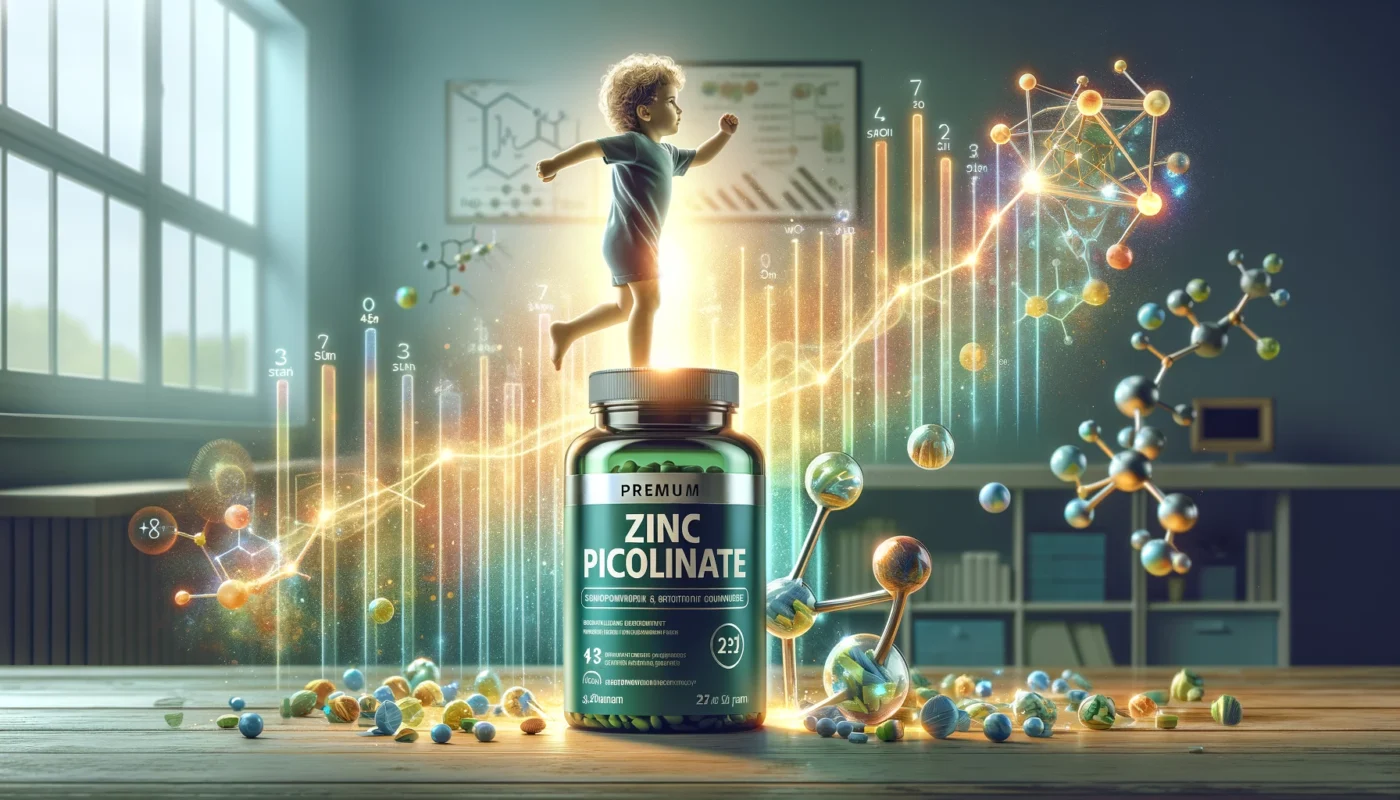Growth is one of the most crucial indicators of a child’s overall health and well-being. During childhood, proper physical development depends on a balanced diet, adequate rest, and sufficient levels of key nutrients. Among these, zinc is particularly vital for supporting growth. This trace mineral plays a significant role in cellular growth, immune function, and tissue repair, all of which are critical during a child’s formative years. However, zinc deficiency is widespread, affecting millions of children globally, particularly in low- and middle-income countries. Zinc picolinate, a highly bioavailable form of zinc, offers a promising solution for addressing deficiencies and promoting healthy growth.
This article explores the role of zinc picolinate in pediatric growth, its mechanisms of action, and the evidence supporting its use in children.
You May Also Like:
Zinc Picolinate for Active Kids: Supporting Growth Spurts
Zinc Picolinate and Preconception Health: Supporting Fertility and Wellness
Zinc Picolinate and Pediatric Growth: Can It Support Healthy Development? is an original (HSLHealing) article.
Why Zinc Is Essential for Pediatric Growth
Zinc is involved in a wide range of biological functions essential for growth and development:
- Cellular Division and DNA Synthesis:
Zinc is a cofactor for enzymes involved in DNA replication and protein synthesis, processes critical for cell growth and tissue development. - Bone Development:
Zinc supports bone mineralization and skeletal growth, ensuring proper height and structural development. - Appetite Regulation:
Zinc stimulates appetite and promotes better nutrient intake, which is essential for healthy weight gain. - Immune System Support:
Zinc strengthens the immune system, reducing the frequency of illnesses that can disrupt growth. - Wound Healing and Tissue Repair:
Zinc accelerates the repair of damaged tissues, ensuring uninterrupted growth during periods of illness or injury.

What Is Zinc Picolinate?
Zinc picolinate is a chelated form of zinc, where zinc is bound to picolinic acid. This structure enhances the absorption of zinc in the gastrointestinal tract, making it more bioavailable than other forms such as zinc oxide or zinc sulfate. For children, who often have increased zinc requirements during growth spurts, zinc picolinate provides a reliable and efficient way to meet these needs.
Zinc Deficiency in Children: A Global Concern
Zinc deficiency is a widespread nutritional issue that disproportionately affects children, particularly in developing countries. The causes of zinc deficiency include:
- Poor Dietary Intake: Diets low in zinc-rich foods, such as meat and seafood.
- Malabsorption Disorders: Conditions like celiac disease and Crohn’s disease that impair nutrient absorption.
- Frequent Infections: Chronic diarrhea and infections increase zinc losses and hinder its absorption.
Statistics:
- According to the World Health Organization (WHO), approximately 17% of the global population is at risk of zinc deficiency, with children in developing countries being the most affected.
- A study in American Journal of Clinical Nutrition reported that zinc deficiency contributes to stunted growth in over 150 million children worldwide.
Consequences of Zinc Deficiency in Children:
- Delayed growth and development
- Increased risk of infections
- Poor appetite and malnutrition
- Delayed wound healing
How Zinc Picolinate Supports Growth in Children
Zinc picolinate is particularly effective in addressing zinc deficiencies and supporting growth due to its high bioavailability and gentle nature. Here’s how it contributes to pediatric development:
1. Promoting Height and Bone Growth
Zinc stimulates the production of growth hormone and insulin-like growth factor-1 (IGF-1), both of which are critical for skeletal development.
- Study Finding: A meta-analysis published in Pediatrics found that zinc supplementation increased height-for-age scores in zinc-deficient children by an average of 0.37 standard deviations compared to control groups.
2. Improving Weight Gain
Zinc enhances appetite and supports protein metabolism, promoting healthy weight gain in children with low body mass indices.
- Clinical Insight: A study in Journal of Nutrition demonstrated that zinc supplementation improved weight-for-age scores in malnourished children, helping them achieve healthier growth rates.
3. Boosting Immune Function
Frequent illnesses can disrupt growth by diverting the body’s resources away from development. Zinc strengthens immune defenses, reducing the frequency and severity of infections.
- Evidence: Research in Nutrients showed that zinc supplementation reduced the incidence of diarrhea and pneumonia in children, allowing for more consistent growth.
4. Enhancing Nutritional Absorption
Zinc supports the health of intestinal cells, improving nutrient absorption and utilization. This is particularly beneficial for children recovering from malnutrition or gastrointestinal infections.
- Study Insight: A study in Clinical Nutrition found that zinc supplementation enhanced the absorption of critical nutrients like iron and calcium, further supporting growth.
5. Supporting Cognitive Development Alongside Physical Growth
While zinc’s role in growth is well-established, its contributions to cognitive development are equally important. Zinc picolinate ensures that the brain receives adequate nutrition during critical developmental periods.
- Clinical Evidence: A randomized controlled trial in Pediatric Research found that zinc supplementation improved cognitive performance alongside physical growth in children aged 6–12.

Clinical Studies Supporting Zinc for Pediatric Growth
- Zinc and Height Growth (2014):
A study in American Journal of Clinical Nutrition evaluated the effects of zinc supplementation in stunted children. Participants receiving 10 mg of zinc daily for six months showed significant improvements in height and weight compared to those on a placebo. - Zinc and Malnourished Children (2017):
Research in Pediatrics found that zinc supplementation improved weight-for-height scores in children with severe acute malnutrition, accelerating their recovery. - Zinc Deficiency and Growth Hormones (2019):
A study in Endocrine Research demonstrated that zinc supplementation increased serum IGF-1 levels, promoting linear growth in prepubescent children. - Zinc and Growth Recovery Post-Illness (2020):
A clinical trial published in Journal of Tropical Pediatrics found that zinc supplementation shortened the recovery time from diarrheal illnesses, allowing children to resume normal growth patterns more quickly.
Dietary Sources of Zinc for Children
While supplementation with zinc picolinate is effective, incorporating zinc-rich foods into a child’s diet is also beneficial. Some zinc-rich foods include:
- Animal-Based Sources: Beef, chicken, eggs, and dairy products.
- Plant-Based Sources: Lentils, chickpeas, pumpkin seeds, and fortified cereals.
For children with dietary restrictions, zinc picolinate serves as an excellent alternative to ensure adequate intake.
Recommended Dosage and Safety
The recommended dietary allowance (RDA) for zinc varies by age:
- 1–3 years: 3 mg/day
- 4–8 years: 5 mg/day
- 9–13 years: 8 mg/day
Therapeutic doses of zinc picolinate for addressing deficiencies and supporting growth typically range from 10–20 mg/day, depending on the child’s needs. Excessive zinc intake (above 40 mg/day) can cause side effects such as:
- Nausea
- Gastrointestinal discomfort
- Reduced copper absorption
Note: Always consult a healthcare provider before starting supplementation to ensure proper dosage and safety.

How to Incorporate Zinc Picolinate into a Child’s Routine
- Choose a Child-Friendly Formulation: Look for chewable tablets or liquid zinc picolinate supplements designed for children.
- Pair with Food: Zinc is best absorbed when taken with meals, particularly those containing protein.
- Monitor Progress: Track your child’s growth and overall health to assess the effectiveness of supplementation.
Future Research Directions
While significant evidence supports zinc picolinate’s role in pediatric growth, further research could explore:
- Long-term effects of zinc supplementation on growth and immune function.
- The interaction between zinc and other nutrients, such as vitamin D and calcium, in promoting growth.
- The role of zinc supplementation in preventing stunting and malnutrition in low-resource settings.
Conclusion: Zinc Picolinate for Supporting Healthy Growth
Zinc picolinate provides a scientifically supported, practical solution for addressing childhood zinc deficiencies and promoting healthy growth. By enhancing height and weight gain, strengthening immunity, and improving nutrient absorption, zinc picolinate ensures that children achieve their full developmental potential.
For parents and caregivers, incorporating zinc picolinate into a child’s diet or supplementation plan can significantly improve growth outcomes and overall well-being. As always, consult with a pediatrician to tailor supplementation to your child’s individual needs and ensure safe and effective use.

References
- Effect of Zinc Supplementation on Growth Outcomes in Children under 5 Years of Age. Retrieved from: https://pmc.ncbi.nlm.nih.gov/articles/PMC5872795/
- Zinc supplementation enhances linear growth in school-aged children: A randomized controlled trial. Retrieved from: https://pmc.ncbi.nlm.nih.gov/articles/PMC5768092/
- Effect of supplemental zinc on the growth and serum zinc concentrations of prepubertal children: a meta-analysis of randomized controlled trials. Retrieved from: https://www.sciencedirect.com/science/article/pii/S0002916523062433
- Effect of Zinc supplementation on child development: a systematic review and metaanalysis Protocol. Retrieved from: https://pmc.ncbi.nlm.nih.gov/articles/PMC7856432/
- Effects of micronutrients on growth of children under 5 y of age: meta-analyses of single and multiple nutrient interventions. Retrieved from: https://www.sciencedirect.com/science/article/pii/S0002916523239246
Important Note: The information contained in this article is for general informational purposes only, and should not be construed as health or medical advice, nor is it intended to diagnose, prevent, treat, or cure any disease or health condition. Before embarking on any diet, fitness regimen, or program of nutritional supplementation, it is advisable to consult your healthcare professional in order to determine its safety and probable efficacy in terms of your individual state of health.
Regarding Nutritional Supplements Or Other Non-Prescription Health Products: If any nutritional supplements or other non-prescription health products are mentioned in the foregoing article, any claims or statements made about them have not been evaluated by the U.S. Food and Drug Administration, and such nutritional supplements or other health products are not intended to diagnose, treat, cure, or prevent any disease.

